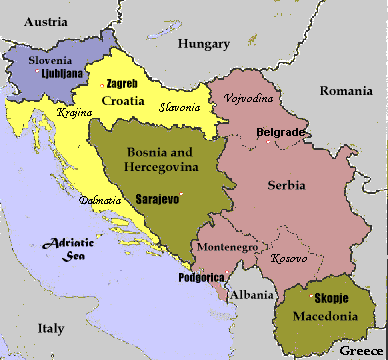Why did President Clinton send military troops to Bosnia?
1 Answer
Initially President Bill Clinton sent U.S. military troops to Bosnia on behalf of the North Atlantic Treaty Organization's (NATO's) peacekeeping efforts. Eventually he sent troops to uphold a peace treaty and protect peacekeepers.
Explanation:
Before I expound upon the actual incident I want to briefly disabuse a commonly held misconception about the North Atlantic Treaty Organization (NATO). NATO is not solely comprised of the United States, Canada, and Mexico (although the U.S. does provide the largest number of NATO personnel). NATO is comprised of every nation in Western Europe (with the exception of Austria and Switzerland [Mexico isn't a member either]) and Turkey.
Below is an image of the current NATO nations:
Image Courtesy of: Ssolbergj (Wikipedia User); Accessed from: 
Without further ado, the incident:
The Socialist Federal Republic of Yugoslavia (I'll refer to it as "Yugoslavia") was essentially a smorgasbord of distinct ethnicities from its inception in 1945. Yugoslavia was divided into 6 ethnic regions called republics (kind of like states or provinces). A majority of the power was initially concentrated within each of the individual regions. In the late 1960s when the national government attempted to centralize power in nation's capital this generated resentment and unrest amongst the ethnic groups. In May of 1980, the 3-decade long leader of Yugoslavia, Josip Broz Tito, died from surgical complications. Tito was essentially the glue that held Yugoslavia together.

Image courtesy of: Slavic Cataloging Manual, Princeton University; Accessed from: http://library.princeton.edu/departments/tsd/katmandu/sgman/yugo.html; Reused under Public Domain
Above is an image of the ethinic regions in Yugoslavia circa 1991.
Nationalism, ethnic conflict, economic volatility, and frustration toward the government (due to the failures of political figures and international politics) caused everything to reach a fever-pitch. The relations between the regions deteriorated to the point where violent ethnic protest ran rampant while each region vied for greater autonomy and independence. Eventually the situation had devolved to the point where the regions were using their respective armies against each other.
In 1992 Bosnia and Herzegovina erupted into armed territorial conflict over independence from Yugoslavia causing Bosnia (and Herzegovina) to descend into war. In an effort to try to establish their own nation the Bosnians along with the Serbs attempted to overtake the capital of Yugoslavia in the Siege of Sarajevo which lasted the better part of three years (April 1992- February 1996; the longest siege of a capital city ever) and through the ethnic cleansing of Bosnian Muslims in 1995. This ethnic cleansing, which is also referred to as the Bosnian Genocide, transpired in an attempt to integrate disjointed regions of what the Serbs felt was their territory.
NATO was monitoring the situation in the weltering political climate that was Yugoslavia, just prior to the Bosnian Genocide. In February of 1992, as a symbolic gesture, NATO attempted to compel the combatants to allow United Nations (UN) peacekeepers into the region. The situation in Yugoslavia continued to deteriorate and by mid-July of the same year NATO and the UN Security Council agreed to place sanctions on the Yugoslavia, establishing a maritime blockade and a no-fly zone (at this point it was mainly just for show). In November the UN and NATO decided to increase the effectiveness of the sanctions stopping and searching all ships in Yugoslavia's waters and using fighter aircraft to prevent unauthorized planes from flying in the area. In 1993 NATO deployed ground forces (combatants, not peacekeepers this time) and authorized its ships and aircraft to provide military support. Things continued to grow worse and in 1994 NATO troops were fully engaged in combat roles such as airstrikes.
The conflict ended with the signing of the Dayton Accord. Prior to the signing of the Dayton Accord however the US sent its first non-NATO troops to Bosnia in an attempt to uphold the peace and once the Accord was signed make sure that all parties complied and to lay the groundwork (protect) for UN peacekeepers.
I hope this helps! I know it's long but this is the ultra spark-notes version.

